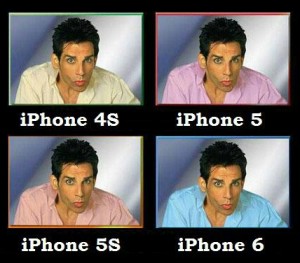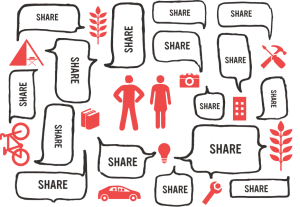Rachel makes a great point about our mindless addictions in life, and I admit since my nephew downloaded cookie jam on my phone I have become a little addicted. Jamie provides a nice summary of this week’s reading, recapping on Watts’ discussion on the power grid. Loving the yellow on your blog page too Jamie. And some thoughtfulness from Michael about setting up an Instagram account and wondering if he is the same person in real life as his presence in the digital landscape. Good question.
Author Archives: carlibarron
Symposium notes
Today’s lecture began like most others do which is finishing off from last week, Adrian touched on the fact that the term Digital Media is actually an oxymoron, given that all media is now digital.
In a nutshell…
- The notion of networking goes way back and the internet is one idea of networking
- The original intent of a technology is not always how it is used
- Technologies are not neutral although they may be geared towards a certain use over others they can still be used for other purposes- we should look at the relationship of a technology with other things and not just what we think it’s originally intended for. (This is in line with Raymond William’s idea that a technology isn’t a technology unless it’s being used, so it doesn’t matter if you’re using it for it’s intended purpose, if it’s being used it’s a technology)
- Print literacy asks certain things of us- we will analyse things and situations in a certain way. Preliteracy thinks differently.
- Nothing is isolated in society so why do we ask to ‘look at things individually’? In this week’s reading, Watts explains we can learn to understand individual behaviour but when it’s a collection it’s when it can be unpredictable. So we do or don’t isolate things in terms of research and theory?
Six Degrees- Duncan J. Watts
First of all I must point out that the author’s name is Watts and for the first half of this article he gives examples using power grids. Anyway, this article was overall quite interesting as Watts discusses the topic of networks as systems and how we might understand the behaviours of component individually but collectively behaviour changes. I also learned where the term ‘Six Degrees of Separation’ came from, hence the title.
There were many points made in this article but also many questions were raised, such as ‘how vulnerable are large infrastructure networks like the power grid or the internet to random failures or deliberate attacks?’ Many questions Watts raised can’t be answered due to the fact they are still researching this area which is annoying as I’d really like to know the answer to this one. I’m pretty sure not that long ago there was talk about a terrorist act on the world could involve cutting the cables of the internet. I found this interesting article written back in 2012 ‘Four ways the Internet could go down’, although insightful I don’t think we could never really know just how vulnerable we are to these four problems.
New iPhone
My cousin posted this on Facebook earlier. I don’t have an iPhone (but would like one). Is this the view of people in general? Or the view of a Samsung lover?

Reading & Peer review
Good on ya Amy for having a crack at the Symposium questions even though you were sick and couldn’t make it. Well said by Stefan who observed how difficult it was to review other people’s readings when we hadn’t done them. And finally a shout out to Alex who has a good post on privacy violation.
**This is where my notes on the reading would be.
A symposium reflection
Hmmm yes definitely needing some motivation to get back into it after the break. So in yesterday’s lecture I was 100% physically present (yep all body parts were there) but maybe only 50% mentally present. I’m finding many points discussed in lectures are quite repetitive from previous weeks so for my personal interest I’d like a little more traction.
Adrian talked about how language cannot guarantee the intent of the message and how words only mean something by virtue of what it isn’t. He also discussed the ‘unconscious mind’ and how there is an element of us that has no control over what we do. Now I’m no Freud expert but I would have thought we may not have control over our desires but we have control over what we do? Psychoanalysis goes way too deep for me and there are conflicting views on this but I do find it very interesting.There is this idea called the Freudian Slip, where our unconscious interferes with our actions. I have no idea how this relates to Network Media but there you go.
Compulsory review of fellow bloggers
Neeve was reminded of the Goosebumps (choose your own adventure) books as a kid when it comes to hypertext. I used to love these books and that’s probably about the closest we’ll get as a reader to interacting with print text. Amy takes a great quote from a reading “We must write with an awareness that we are writing in the presence of other texts” and asks if we know where to draw the line when writing for public and private purposes. And finally I’m totally with Kenton on his reaction to the reading in week four. I start my readings like this most weeks.
A symposium note
I went to review my notes from the symposium last Tuesday and realised I had three points and these three points were basically notes I had written down from a reading that were just worded differently. So one point I have is…
“Having a porous platform to connect media to other media”.
Porous is about having an easy flow or passage in and out. So being able to apply this to information is exactly how the web works today. For me this was about understanding the history of connecting media. Great example here that explains the difference between the internet and the WWW.
When the web started it was Web 1.0, this was read only. There was little interaction from the reader. When Web 2.0 was introduced (popularized in 2004) it allowed for collaboration and sharing of information between users. This is where social media comes in.
I found this great slide share that gives a basic outline of the progression of the web. A couple of points it makes about Web 1.0 are:
- Read only web
- Limited user interaction
Web 2.0 was when the user was able to participate through blogging, podcasting and tagging to name a few. This created a more porous platform for sharing and connecting through the web.
Teenagers: the real world or the internet
This article from Daily Mail (UK) discusses teenagers preferring the internet to real life. Something to consider when children are learning on the internet is their vulnerability. We talked in the symposiums about uni students not necessarily being able to tell the validity of stuff on the internet so what about young teenagers and children? There are far more concerning things than knowing if an article is academic or not like cyber bullying. I think children should definitely be learning by doing but there should be guidance, from both teachers and parents. I am not sure of the curriculum for primary aged children at school now when it comes to learning about the internet but I’d be interested to find out.

